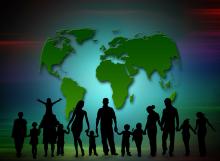All News on Social Issues in Croatia
In Montenegro, Memories of Pain and Generosity on the Refugee Road
Dejan, then 20, had been nearing the end of his military service in Kosovo, then a southern province of Serbia, when NATO launched air strikes to halt a brutal Serbian counter-insurgency war. At the time, Serbia and Montenegro were all that was left of Yugoslavia, still joined together after the other four republics - Bosnia and Herzegovina, Croatia, Slovenia and Macedonia - had seceded.
Bosnia Data Contradicts Croatian Claim about Migrant, Refugee ‘Readmissions’
According to the Service's figures, 3,433 people have been 'readmitted' since 2017, the year that migrants and refugees mainly from the Middle East, Asia and Africa began crossing Bosnia in any great numbers. That does not include the thousands returned illegally, so-called 'pushbacks' across the border that fly in the face of the internationally-guaranteed right to seek asylum.
Pandemic and Earthquakes Take Toll on Young Croatians’ Mental Health
Boris Jokic from the Institute for Social Research told a panel discussion at the Journalists' House in Zagreb on Friday that the coronavirus pandemic and the large-scale earthquakes that hit Croatia in 2020 strengthened school pupils' relationships with their family and friends but negatively affected their mental health.
Child Pornography, Hate Speech and Cybercrime Surge in Balkans
Child Porn Scandals Rock Romania, Croatia
In April, Romania saw a surge in cases involving child pornography, with victims as young as seven years old. Croatia recorded similar cases.
Women with their eyes covered with violet scarfs participate in a flash mob in front of Romania's Internal Affairs Minister in Bucharest, Romania, 01 March 2020. Photo: EPA-EFE/BOGDAN CRISTEL
Migrants’ Mass Expulsions from Croatia Raise Legal Doubts
Besides such abuses, experts also say the procedure could be illegal. "There are some doubts over the legality of what we are seeing happening between Croatia and Bosnia and Herzegovina in terms of European law," Italian jurist and migration expert Gianfranco Schiavone told BIRN.
Not allowed to seek asylum















